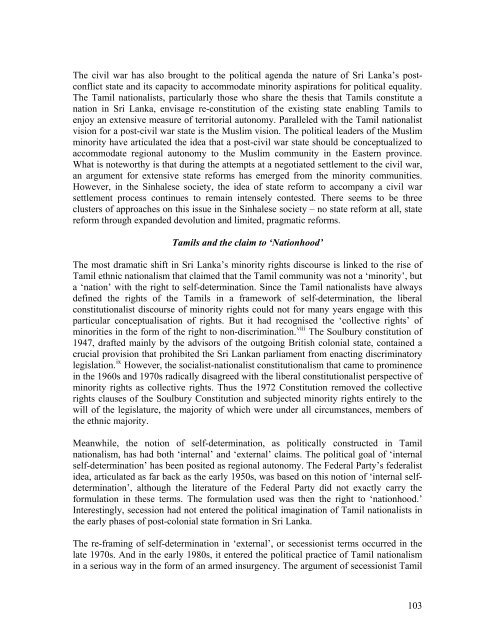Living on the Margins. Minorities in South Asia - EURAC
Living on the Margins. Minorities in South Asia - EURAC
Living on the Margins. Minorities in South Asia - EURAC
- TAGS
- minorities
- eurac
- www.eurac.edu
Create successful ePaper yourself
Turn your PDF publications into a flip-book with our unique Google optimized e-Paper software.
The civil war has also brought to <strong>the</strong> political agenda <strong>the</strong> nature of Sri Lanka’s postc<strong>on</strong>flict<br />
state and its capacity to accommodate m<strong>in</strong>ority aspirati<strong>on</strong>s for political equality.<br />
The Tamil nati<strong>on</strong>alists, particularly those who share <strong>the</strong> <strong>the</strong>sis that Tamils c<strong>on</strong>stitute a<br />
nati<strong>on</strong> <strong>in</strong> Sri Lanka, envisage re-c<strong>on</strong>stituti<strong>on</strong> of <strong>the</strong> exist<strong>in</strong>g state enabl<strong>in</strong>g Tamils to<br />
enjoy an extensive measure of territorial aut<strong>on</strong>omy. Paralleled with <strong>the</strong> Tamil nati<strong>on</strong>alist<br />
visi<strong>on</strong> for a post-civil war state is <strong>the</strong> Muslim visi<strong>on</strong>. The political leaders of <strong>the</strong> Muslim<br />
m<strong>in</strong>ority have articulated <strong>the</strong> idea that a post-civil war state should be c<strong>on</strong>ceptualized to<br />
accommodate regi<strong>on</strong>al aut<strong>on</strong>omy to <strong>the</strong> Muslim community <strong>in</strong> <strong>the</strong> Eastern prov<strong>in</strong>ce.<br />
What is noteworthy is that dur<strong>in</strong>g <strong>the</strong> attempts at a negotiated settlement to <strong>the</strong> civil war,<br />
an argument for extensive state reforms has emerged from <strong>the</strong> m<strong>in</strong>ority communities.<br />
However, <strong>in</strong> <strong>the</strong> S<strong>in</strong>halese society, <strong>the</strong> idea of state reform to accompany a civil war<br />
settlement process c<strong>on</strong>t<strong>in</strong>ues to rema<strong>in</strong> <strong>in</strong>tensely c<strong>on</strong>tested. There seems to be three<br />
clusters of approaches <strong>on</strong> this issue <strong>in</strong> <strong>the</strong> S<strong>in</strong>halese society – no state reform at all, state<br />
reform through expanded devoluti<strong>on</strong> and limited, pragmatic reforms.<br />
Tamils and <strong>the</strong> claim to ‘Nati<strong>on</strong>hood’<br />
The most dramatic shift <strong>in</strong> Sri Lanka’s m<strong>in</strong>ority rights discourse is l<strong>in</strong>ked to <strong>the</strong> rise of<br />
Tamil ethnic nati<strong>on</strong>alism that claimed that <strong>the</strong> Tamil community was not a ‘m<strong>in</strong>ority’, but<br />
a ‘nati<strong>on</strong>’ with <strong>the</strong> right to self-determ<strong>in</strong>ati<strong>on</strong>. S<strong>in</strong>ce <strong>the</strong> Tamil nati<strong>on</strong>alists have always<br />
def<strong>in</strong>ed <strong>the</strong> rights of <strong>the</strong> Tamils <strong>in</strong> a framework of self-determ<strong>in</strong>ati<strong>on</strong>, <strong>the</strong> liberal<br />
c<strong>on</strong>stituti<strong>on</strong>alist discourse of m<strong>in</strong>ority rights could not for many years engage with this<br />
particular c<strong>on</strong>ceptualisati<strong>on</strong> of rights. But it had recognised <strong>the</strong> ‘collective rights’ of<br />
m<strong>in</strong>orities <strong>in</strong> <strong>the</strong> form of <strong>the</strong> right to n<strong>on</strong>-discrim<strong>in</strong>ati<strong>on</strong>. viii The Soulbury c<strong>on</strong>stituti<strong>on</strong> of<br />
1947, drafted ma<strong>in</strong>ly by <strong>the</strong> advisors of <strong>the</strong> outgo<strong>in</strong>g British col<strong>on</strong>ial state, c<strong>on</strong>ta<strong>in</strong>ed a<br />
crucial provisi<strong>on</strong> that prohibited <strong>the</strong> Sri Lankan parliament from enact<strong>in</strong>g discrim<strong>in</strong>atory<br />
legislati<strong>on</strong>. ix However, <strong>the</strong> socialist-nati<strong>on</strong>alist c<strong>on</strong>stituti<strong>on</strong>alism that came to prom<strong>in</strong>ence<br />
<strong>in</strong> <strong>the</strong> 1960s and 1970s radically disagreed with <strong>the</strong> liberal c<strong>on</strong>stituti<strong>on</strong>alist perspective of<br />
m<strong>in</strong>ority rights as collective rights. Thus <strong>the</strong> 1972 C<strong>on</strong>stituti<strong>on</strong> removed <strong>the</strong> collective<br />
rights clauses of <strong>the</strong> Soulbury C<strong>on</strong>stituti<strong>on</strong> and subjected m<strong>in</strong>ority rights entirely to <strong>the</strong><br />
will of <strong>the</strong> legislature, <strong>the</strong> majority of which were under all circumstances, members of<br />
<strong>the</strong> ethnic majority.<br />
Meanwhile, <strong>the</strong> noti<strong>on</strong> of self-determ<strong>in</strong>ati<strong>on</strong>, as politically c<strong>on</strong>structed <strong>in</strong> Tamil<br />
nati<strong>on</strong>alism, has had both ‘<strong>in</strong>ternal’ and ‘external’ claims. The political goal of ‘<strong>in</strong>ternal<br />
self-determ<strong>in</strong>ati<strong>on</strong>’ has been posited as regi<strong>on</strong>al aut<strong>on</strong>omy. The Federal Party’s federalist<br />
idea, articulated as far back as <strong>the</strong> early 1950s, was based <strong>on</strong> this noti<strong>on</strong> of ‘<strong>in</strong>ternal selfdeterm<strong>in</strong>ati<strong>on</strong>’,<br />
although <strong>the</strong> literature of <strong>the</strong> Federal Party did not exactly carry <strong>the</strong><br />
formulati<strong>on</strong> <strong>in</strong> <strong>the</strong>se terms. The formulati<strong>on</strong> used was <strong>the</strong>n <strong>the</strong> right to ‘nati<strong>on</strong>hood.’<br />
Interest<strong>in</strong>gly, secessi<strong>on</strong> had not entered <strong>the</strong> political imag<strong>in</strong>ati<strong>on</strong> of Tamil nati<strong>on</strong>alists <strong>in</strong><br />
<strong>the</strong> early phases of post-col<strong>on</strong>ial state formati<strong>on</strong> <strong>in</strong> Sri Lanka.<br />
The re-fram<strong>in</strong>g of self-determ<strong>in</strong>ati<strong>on</strong> <strong>in</strong> ‘external’, or secessi<strong>on</strong>ist terms occurred <strong>in</strong> <strong>the</strong><br />
late 1970s. And <strong>in</strong> <strong>the</strong> early 1980s, it entered <strong>the</strong> political practice of Tamil nati<strong>on</strong>alism<br />
<strong>in</strong> a serious way <strong>in</strong> <strong>the</strong> form of an armed <strong>in</strong>surgency. The argument of secessi<strong>on</strong>ist Tamil<br />
103

















